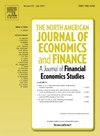Static and dynamic return and volatility connectedness between transportation tokens and transportation indices: Evidence from quantile connectedness approach
IF 3.8
3区 经济学
Q1 BUSINESS, FINANCE
North American Journal of Economics and Finance
Pub Date : 2024-11-10
DOI:10.1016/j.najef.2024.102312
引用次数: 0
Abstract
The aim of the study is to examine the return and volatility connectedness between transportation tokens and transportation stock indices. Since the QVAR model is used in the study, we can obtain information about the return and volatility connectedness between assets not only under normal market conditions but also under extreme market conditions. The return and volatility spillovers between transportation tokens and transportation stock indices are time-varying and also vary under different market conditions. Under normal market conditions, transportation tokens and transportation indices are largely unconnected. The return connectedness between the assets increases significantly during extreme market downturns and upturns, with similar increases in volatility connectedness during periods of extreme volatility. Return and volatility connectedness between assets are affected by extreme events such as COVID-19, the Russia–Ukraine war, and the collapse of the cryptocurrency market. The study investigates the determinants of total return and volatility connectedness between transportation tokens and transportation stock indices. It is found that EPU, GVZ, VIX, and crises are significant determinants affecting the return and volatility connectivity between transportation tokens and transportation stock indices across all market conditions. The results are significant for strategies to be implemented by investors and portfolio managers.
交通代币与交通指数之间的静态和动态收益率与波动率关联性:量化关联性方法的证据
本研究的目的是考察交通代币与交通股指数之间的收益和波动关联性。由于研究中使用了 QVAR 模型,因此我们不仅可以获得正常市场条件下的资产回报率和波动率关联信息,还可以获得极端市场条件下的资产回报率和波动率关联信息。交通代币与交通股指之间的收益和波动溢出效应是时变的,在不同的市场条件下也各不相同。在正常市场条件下,交通代币和交通指数之间基本没有联系。在市场极度低迷和上升期间,资产之间的收益关联性会显著增加,在极度波动期间,波动关联性也会类似增加。资产间的收益率和波动率关联性受到 COVID-19、俄乌战争和加密货币市场崩溃等极端事件的影响。本研究调查了交通代币与交通股指之间总回报率和波动率关联性的决定因素。研究发现,在所有市场条件下,EPU、GVZ、VIX 和危机都是影响交通代币与交通股指之间回报和波动连接性的重要决定因素。研究结果对投资者和投资组合经理实施策略具有重要意义。
本文章由计算机程序翻译,如有差异,请以英文原文为准。
求助全文
约1分钟内获得全文
求助全文
来源期刊
CiteScore
7.30
自引率
8.30%
发文量
168
期刊介绍:
The focus of the North-American Journal of Economics and Finance is on the economics of integration of goods, services, financial markets, at both regional and global levels with the role of economic policy in that process playing an important role. Both theoretical and empirical papers are welcome. Empirical and policy-related papers that rely on data and the experiences of countries outside North America are also welcome. Papers should offer concrete lessons about the ongoing process of globalization, or policy implications about how governments, domestic or international institutions, can improve the coordination of their activities. Empirical analysis should be capable of replication. Authors of accepted papers will be encouraged to supply data and computer programs.

 求助内容:
求助内容: 应助结果提醒方式:
应助结果提醒方式:


